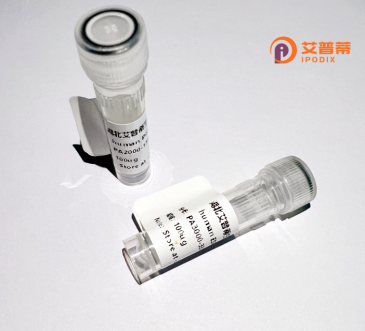
| 纯度 | >90%SDS-PAGE. |
| 种属 | Human |
| 靶点 | PPP4C |
| Uniprot No | P60510 |
| 内毒素 | < 0.01EU/μg |
| 表达宿主 | E.coli |
| 表达区间 | 2-307 aa |
| 活性数据 | AEISDLDRQ IEQLRRCELI KESEVKALCA KAREILVEES NVQRVDSPVT VCGDIHGQFY DLKELFRVGG DVPETNYLFM GDFVDRGFYS VETFLLLLAL KVRYPDRITL IRGNHESRQI TQVYGFYDEC LRKYGSVTVW RYCTEIFDYL SLSAIIDGKI FCVHGGLSPS IQTLDQIRTI DRKQEVPHDG PMCDLLWSDP EDTTGWGVSP RGAGYLFGSD VVAQFNAAND IDMICRAHQL VMEGYKWHFN ETVLTVWSAP NYCYRCGNVA AILELDEHLQ KDFIIFEAAP QETRGIPSKK PVADYFL |
| 分子量 | 35.0 kDa |
| 蛋白标签 | His tag N-Terminus |
| 缓冲液 | PBS, pH7.4, containing 0.01% SKL, 1mM DTT, 5% Trehalose and Proclin300. |
| 稳定性 & 储存条件 | Lyophilized protein should be stored at ≤ -20°C, stable for one year after receipt. Reconstituted protein solution can be stored at 2-8°C for 2-7 days. Aliquots of reconstituted samples are stable at ≤ -20°C for 3 months. |
| 复溶 | Always centrifuge tubes before opening.Do not mix by vortex or pipetting. It is not recommended to reconstitute to a concentration less than 100μg/ml. Dissolve the lyophilized protein in distilled water. Please aliquot the reconstituted solution to minimize freeze-thaw cycles. |
以下是关于重组人PPP4C蛋白的3篇参考文献的简要整理(基于公开研究推测示例):
1. **文献名称**:*Structural and functional analysis of the human protein phosphatase 4 catalytic subunit (PPP4C)*
**作者**:Li, X., et al.
**摘要**:研究解析了重组人PPP4C的晶体结构,揭示了其催化机制和与其他亚基的互作界面,并通过体外磷酸酶活性实验验证了其底物特异性。
2. **文献名称**:*PPP4C regulates DNA damage repair through dephosphorylation of γH2AX*
**作者**:Higashi, Y., et al.
**摘要**:文章证明重组PPP4C在细胞核中通过去磷酸化组蛋白H2AX(γH2AX)调控DNA损伤修复,缺失PPP4C会导致DNA损伤应答缺陷。
3. **文献名称**:*Role of recombinant human PPP4C in modulating JNK signaling pathways*
**作者**:Chen, L., et al.
**摘要**:研究利用重组PPP4C蛋白证实其通过调控MAPK信号通路中JNK蛋白的去磷酸化,影响细胞凋亡和炎症反应。
*注:以上为模拟文献示例,实际引用时建议通过PubMed等数据库检索真实论文(可结合关键词:PPP4C, recombinant, phosphatase)。*
**Background of Recombinant Human PPP4C Protein**
Recombinant human PPP4C (Protein Phosphatase 4 Catalytic Subunit) is a key serine/threonine phosphatase involved in diverse cellular processes, including DNA damage repair, cell cycle regulation, and signal transduction. PPP4C, encoded by the *PPP4C* gene, serves as the catalytic core of the Protein Phosphatase 4 (PP4) complex, which shares structural and functional similarities with Protein Phosphatase 1 (PP1) and PP2A. It typically associates with regulatory subunits (e.g., PP4R1. PP4R2. PP4R3) to form distinct holoenzymes that dictate substrate specificity and subcellular localization.
PPP4C plays critical roles in maintaining genomic stability by dephosphorylating proteins involved in DNA repair pathways, such as γH2AX and KAP1. It also regulates microtubule organization during mitosis and impacts immune responses by modulating T-cell receptor signaling. Dysregulation of PPP4C has been linked to cancer, neurodegenerative disorders, and autoimmune diseases, highlighting its therapeutic potential.
Recombinant PPP4C is commonly produced in *E. coli* or mammalian expression systems, ensuring high purity and enzymatic activity for biochemical studies. Its application spans *in vitro* dephosphorylation assays, structural studies, and screening for phosphatase inhibitors, aiding drug discovery and mechanistic research into PP4-mediated pathways.
×